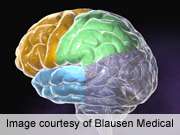Communication between patients and physicians regarding activities that may be beneficial to maintaining cognitive functioning during aging may be lacking, according to a study published online April 18 in Preventing Chronic Disease.
(HealthDay)—Communication between patients and physicians regarding activities that may be beneficial to maintaining cognitive functioning during aging may be lacking, according to a study published online April 18 in Preventing Chronic Disease.
Daniela B. Friedman, Ph.D., from the University of South Carolina in Columbia, and colleagues compared consumers' (4,728) and providers' (1,250) beliefs, practices, and information sources related to maintaining health and cognitive functioning. Ten questions from Porter Novelli's HealthStyles survey and six questions from their DocStyles survey were analyzed.
The researchers found that 76 percent of consumers considered their health to be good or very good and 73.4 percent were concerned or very concerned about the possibility that their memory may worsen with age. Concern was higher among women compared to men and white consumers compared to black and Hispanic consumers. Participants reported believing that intellectual stimulation (86.6 percent), physical activity (82.6 percent), and a healthy diet (82.5 percent) prevented or delayed cognitive impairment. Providers reported advising physical activity (85.9 percent), intellectual stimulation (80.3 percent), and social involvement (67.4 percent) to patients to reduce cognitive impairment risk, though few consumers (7.8 percent) reported receiving this information from providers. Consumers reported learning about memory maintenance strategies from television (50.1 percent), magazines (44.1 percent), and newspapers (33.7 percent).
"Findings suggest a need to examine and assess media messages and to better understand patient-provider communication about cognitive functioning," the authors write.
More information: Full Text
Health News Copyright © 2013 HealthDay. All rights reserved.























